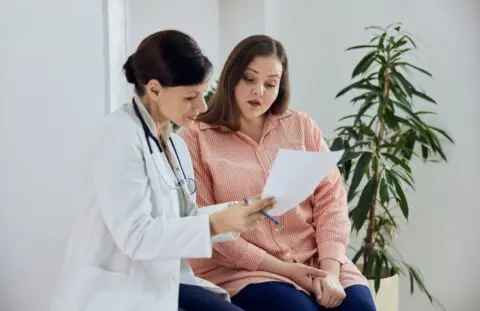What you’ll learn
In this article, you’ll learn about premature and early menopause, how to spot the signs, what might be causing them, and how treatment options can help you take control of yourself and help you feel more like yourself again. We’ll also explain how our providers can support you through every step of the process.
Reaching the end of your reproductive years is a normal part of life for women. But when menopause symptoms start earlier than expected, it’s normal to have questions and concerns. While the average age women hit menopause is 51, some may begin this transition much sooner. If you’re noticing unexpected changes to your period, mood, or energy levels, you might be experiencing early signs of menopause or even premature menopause.
So, what’s the difference between them?
- Early menopause happens if the menopause symptoms begin when you’re between the ages of 40 and 45.
- Premature menopause means experiencing symptoms before the age of 40.
Neither necessarily means something is wrong with your body, but it can feel a little jarring if you’re not prepared for it.
Then there’s the confusion around terms like perimenopause and premenopause, which are often used interchangeably, but there are significant differences in their true medical definitions. Dr. Sheryl Ross (Dr. Sherry), Chief Medical Officer of Women’s Health here at QuickMD, explains that:
- “Premenopause is often used to describe the reproductive years when a woman has periods, without experiencing any symptoms of perimenopause or menopause.
- Perimenopause is the hormonal transition period that occurs before menopause, with estrogen and progesterone fluctuations, leading to disruptive symptoms such as irregular periods, hot flashes, and mood swings.”
Understanding these distinctions is the first step to taking control of your health and feeling like yourself again. Let’s dive deeper into each of these phases to help you more easily identify and navigate these changes.
What is early and premature menopause?
Whether it’s on time, early, or late, the word “menopause” can stop a woman in her hormonal tracks, especially if she is under 40 years old. “The average age of menopause is 51 years old. So, for anyone under 50, it’s not necessarily on your radar that your ovaries can turn against you,” says Dr. Sherry.
That may sound intense, but it captures how many women feel when their bodies start changing unexpectedly.
Before we discuss early menopause and premature menopause, it can help to define menopause itself. Menopause is a natural condition where your ovaries stop producing estrogen. When estrogen production stops, so does your menstruation and fertility. Once you stop having your period for one year, you are officially in menopause.
But sometimes, those hormonal shifts start sooner than expected.
- Early menopause refers to menopause symptoms that begin before age 45.
- Premature menopause describes when you experience menopause symptoms before the age of 40. Often, people use premature menopause and primary ovarian insufficiency (POI) to mean the same thing, but they’re not interchangeable. Women who have POI can still get pregnant, although they have more difficulty conceiving naturally.
Recognizing the signs and symptoms
If you’re under 45, it’s easy to dismiss menopause as something that’s still years away. But hormonal shifts can sneak up in unexpected ways. In early and premature menopause, the same symptoms appear as in typical menopause, just earlier.
Common symptoms include:
- Irregular period
- Hot flashes
- Night sweats
- Depression
- Weight gain or loss
- Anxiety and feelings of apprehension
- Brain fog or poor concentration
- Vaginal dryness
- Reduced sex drive (low libido)
Other less discussed symptoms include:
- Heart palpitations
- Joint pain or stiffness, including “frozen shoulder”
- Itchy or sensitive skin
- Ringing in the ears
- Electric shock sensations
- Gum problems
- Acne
- Urinary tract infections
- Nipple discharge
- Burning mouth syndrome.
Early menopause doesn’t just affect the body. It affects the mind, too. A decrease in estrogen impacts other hormones like serotonin (often called “the happy hormone”) that helps regulate mood, sleep, and stress response. This hormonal rollercoaster can lead to:
- Irritability or emotional outbursts
- Low self-esteem and feelings of hopelessness
- Trouble concentrating
- A sense of feeling “not like yourself”
These changes are real and valid. They’re not “just in your head.” Although these symptoms can affect your quality of life, they can be improved with lifestyle modifications and medications (such as hormone replacement therapy) designed to treat each symptom.
If you think you may be experiencing early menopause, speaking with a healthcare provider can help you better understand what’s happening and discuss a personalized care plan and treatment options.
Understanding the cause & diagnosis
Early menopause occurs when the ovaries begin producing significantly less estrogen than expected for your age. In some cases, this happens gradually. In other cases, it can be sudden, especially after medical treatment or surgery. Some possible causes of early menopause include:
- Surgical menopause: Removal of the ovaries or uterus (especially both) triggers an immediate drop in estrogen.
- Smoking: Studies show that smokers may experience menopause symptoms up to two years earlier than non-smokers.
- Family history: If early menopause runs in your family, your chances increase.
- Autoimmune conditions: Thyroid disease, lupus, and rheumatoid arthritis can contribute to early ovarian decline.
- Cancer treatments: Chemotherapy or pelvic radiation can damage the ovaries and hasten menopause.
- Chronic health conditions: Untreated HIV/AIDS or chromosomal conditions like Turner syndrome may play a role.
If you’re experiencing early signs of menopause, a provider can help you get clear answers. They may recommend:
- A thorough symptom review
- Blood tests
- Hormone panels (FSH, LH, estradiol)
Once you have a confirmed diagnosis, you and your provider can work together to tailor the next steps for you.
Health impacts of early menopause
Catching early menopause matters not just for symptom relief but for long-term health protection.
- Osteoporosis: Estrogen is essential for bone density. Without it, bones weaken faster, and fracture risk increases.
- Heart disease: Estrogen helps regulate cholesterol and maintain blood vessel flexibility. Without it, heart disease risk rises.
- Mood disorders: Fluctuating hormones can increase the risk of depression and anxiety.
- Cognitive decline: Brain fog is real. Estrogen supports memory and cognitive sharpness. Without it, some people notice more forgetfulness and difficulty focusing.
Hormone treatments and medication
- Menopause hormone therapy (MHT): MHT can be highly effective in relieving disruptive symptoms like hot flashes, vaginal dryness, and mood swings. If started early (especially before age 60 or within 10 years of menopause onset), it may even protect heart and bone health. It’s important to speak with a provider to help you find the best fit for your needs based on your medical history and lifestyle.
- Non-hormonal medication: Some medications, like antidepressants or hypertension drugs, can help you regulate body temperature. These could be life-changers because they relieve night sweats that could be keeping you up. Additional medications that also offer this form of relief include Gabapentin and Veozah. While helpful, some of these medications can cause dizziness, drowsiness, or headaches. It’s important to discuss pros and cons with your provider to help you make the choice that’s right for you.
- Acupuncture and relaxation techniques: Acupuncture, cognitive-behavioral therapy, hypnosis, and mindfulness exercises (like yoga and Tai Chi) can help reduce stress, ease anxiety, and help support hormonal balance.
Natural alternatives and supplements
- Mind-body therapies: Acupuncture, cognitive-behavioral therapy (CBT), hypnosis, yoga, and Tai Chi can reduce stress, ease anxiety, and support hormone balance naturally.
- Herbal supplements: Evidence-backed supplements such as passionflower extract, black cohosh, and lemon balm can also help manage perimenopausal symptoms. While these are not FDA-approved like pharmaceuticals, well-regulated supplements may provide relief for mild to moderate symptoms.
Additional herbal options include:
- Red clover
- Ashwagandha
- Rhodiola
- Dong quai
- Maca root
- Evening primrose oil
- Valerian
- St. John’s wort
- Tribulus
- CoQ10
Always speak with your provider before starting any supplement.
Learn more about menopause therapy.
Lifestyle & supportive strategies
A healthy lifestyle doesn’t just help with menopause. It can help your whole life! To supplement any treatment for early menopause, making lifestyle changes is important.
“A diet focused on fresh fruits, vegetables, whole grains, and fish, with limited alcohol intake and little red meat, not only benefits your heart, it improves cognitive function,” observes Dr. Sherry. “The Mediterranean diet is associated with the highest life expectancy and lowest heart disease rate and is proven to help menopausal symptoms. No downside there!”
Other lifestyle changes can also help support your transition through early menopause:
- Limit alcohol: Just a few drinks a week can worsen hot flashes and disrupt sleep.
- Quit smoking: Smoking accelerates estrogen loss.
- Exercise regularly: Cardio and strength training help with weight, mood, and bone health.
- Prioritize sleep: Practice good sleep hygiene and cut back on caffeine and blue light exposure before bed.
- Ditch fast food: Saturated fats and sodium contribute to inflammation and depression.
- Watch sugar: Reducing sweets helps stabilize blood sugar and reduce bloating.
While there are a number of lifestyle changes you can make to help boost your mood and take a proactive approach to keeping your body healthy, don’t overlook the emotional toll of early menopause. Consider:
- Fertility counseling if you’re trying to conceive
- Talk therapy to manage mood changes
- Support groups to connect with others going through similar changes
Frequently asked questions about premature or early menopause
Can I still get pregnant if I have symptoms of early menopause?
Yes. Until you’ve gone a full 12 months without a period, there’s still a chance you can conceive. If you’re not trying to get pregnant, talk to your provider about birth control.
What is usually the first symptom of early menopause?
Often, it starts with changes in your period. Cycles may become irregular, lighter, or heavier than usual. Mood shifts or hot flashes may follow soon after.




